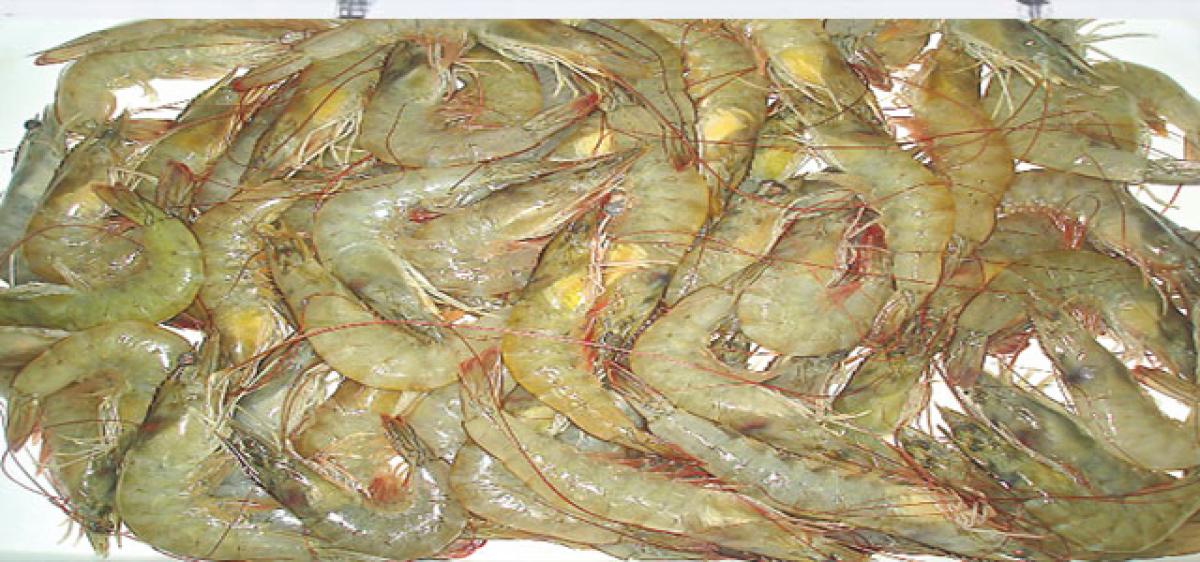Live
- A Guide to Temperature and Humidity Standards in Data Center Server Rooms
- Gadwal collector briefs on details of voters
- Jupally Krishna Rao takes part in Alampur rallu
- Bharath Prasad files 3rd Nomination
- Baisakh Month: A Time of Auspicious Beginnings and Sacred Festivals
- Oust BJD govt for overall development, says Shah
- Unveiling the Hidden Gems: Surprising Health Benefits of Garlic Peels
- Overcoming Sleep Struggles: A Comprehensive Guide to a Restful Night
- RTC bus hit the auto
- MLA Kuchukula Rajesh Reddy participated in the Birappa festival
Just In
Enterocytozoon hepatopenaei virus turns a bane for shrimp farms in coastal districts


Enterocytozoon hepatopenaei (EHP) is an intracellular microsporidian parasite, first characterised and named in 2009 in Thailand, is still haunting vannamei shrimp farms in the state. The parasite, which affected 43 per cent of farms in 2014-15, is still found to be present in 21 per cent farms by March this year.
Nellore: Enterocytozoon hepatopenaei (EHP) is an intracellular microsporidian parasite, first characterised and named in 2009 in Thailand, is still haunting vannamei shrimp farms in the state. The parasite, which affected 43 per cent of farms in 2014-15, is still found to be present in 21 per cent farms by March this year.
In fact, there are no specific symptoms to identify the EHP parasite which would have helped to follow a treatment or management protocol that can stop or interfere with transmission. An alert was sounded three years ago to enlighten the aqua farmers in the state on prevention of the parasite.
Teams from MPEDA (Marine Products Exports Development Authority), National Centre for Sustainable Aquaculture (NaCSA) and fisheries department have collected shrimp samples from all major aqua culture areas in the state.
Central Institute of Brackishwater Aquaculture (CIBA), a wing of ICAR, has also monitored spread of the parasite in around 400 farms across Andhra Pradesh and Tamil Nadu. They found that the parasite was present in around 43 per cent farms during 2015, 27 per cent in 2016, and 21 per cent till March this year.
So, to stop further spread of the parasite, the CIBA has taken up awareness sessions to the famers and companies as part of National Disease Surveillance Programme as the disease has been a growing concern in the Indian shrimp farming industry since 2015. The disease has been spreading to many regions in the country often associated with severe growth retardation in farmed shrimp.
“The parasite severely affects the growth of the shrimp. Horizontal transmission occurs very rapidly among shrimp in ponds due to thorough mixing. Accurate detection is extremely important to ensure biosecurity in shrimp hatcheries and farms.
The parasite reduces growth rate and increases the size variation in the shrimp population,” said Dr Shankar Avalandi, principal scientist, Aquatic Animal Health and Environment wing of CIBA.
The disease was widespread in China, Indonesia, Malaysia, Vietnam, and Thailand earlier. Gradually, it spread to coastal states in India where aqua farms are prevalent. Recently, CIBA developed a kit for detecting the existence of the parasite, which is now on sale.
The institute signed an MoU with Thaper group recently who are establishing laboratories in Nellore and Bhimavaram for providing services as part of corporate social responsibility (CSR) to the farmers at an affordable cost. They say this parasite is more deadly when compared to White Spot, EMS and others that spread some time ago.
The farmers normally face losses due to diseases but this parasite affects slowly, which causes severe losses to them after two-three months. Meanwhile, they spend huge money on the crop and finally incur losses impacting their financial conditions. This can be avoided with early detection, say scientists.
In an effort to create awareness among farmers on different viruses and parasites, Central Institute of Brackishwater Aquaculture developed an app -vanami app- for receiving queries from the farmers from across the globe and also to get information on the current situation. They have been answering them within 24 hours with specific solutions.
“Now, we are getting queries from growers and traders in 23 countries around the world and we are responding to them within 24 hours. The app is currently in English and we are planning to expand it in regional languages for convenience of the farmers,” said Dr Shankar.
By P V Prasad

© 2024 Hyderabad Media House Limited/The Hans India. All rights reserved. Powered by hocalwire.com






